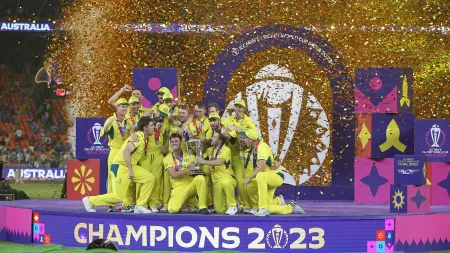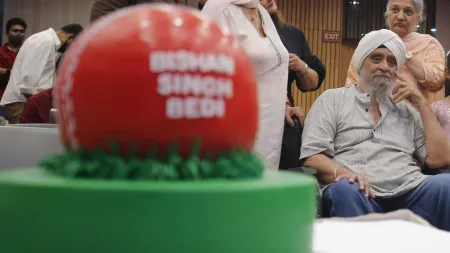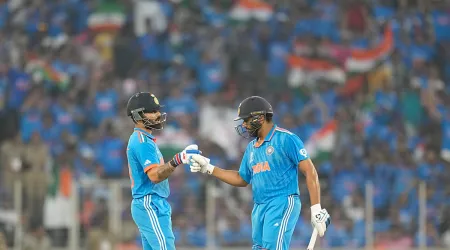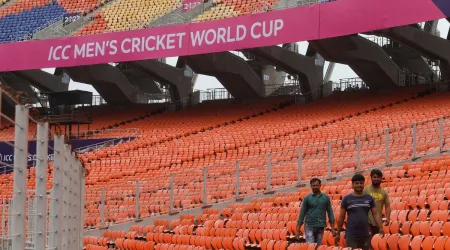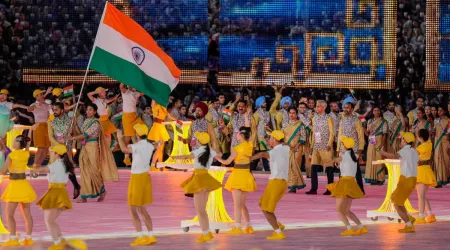- India
- International
ECB, Yorkshire sat on reports they commissioned to look into racism in English cricket
They now talk about rooting out discrimination, but have ignored suggestions made to deal with the problem.
 Dr Thomas Fletcher, who had conducted two reports – one for Yorkshire in 2015 and another for the England and Wales Cricket Board (ECB) in 2014 – isn’t surprised that his reports had fallen into a black hole. (Twitter)
Dr Thomas Fletcher, who had conducted two reports – one for Yorkshire in 2015 and another for the England and Wales Cricket Board (ECB) in 2014 – isn’t surprised that his reports had fallen into a black hole. (Twitter)At the UK Parliamentary hearings about the racism scandal that has hit Yorkshire cricket after former player Azeem Rafiq recounted his horror days at the club, Roger Hutton, the recently-departed chair of Yorkshire board, was asked if he was aware of the ‘Fletcher Report’ from 2014 that had studied British Asians’ problems with the club at the grassroots.
“I was not aware of it,” Hutton said. Lord Kamlesh Patel, who has taken over the club, has said that he will be looking into the Fletcher report and its recommendations. “At the heart of this is listening, and going through our past – including the Fletcher Report – as well as examining our culture and taking positive steps to build a better future,” Patel has said.
Dr Thomas Fletcher, who had conducted two reports – one for Yorkshire in 2015 and another for the England and Wales Cricket Board (ECB) in 2014 – isn’t surprised that his reports had fallen into a black hole. “No doubt the reports were read and useful at lower ends of the game. We know this from communication with the Yorkshire Cricket Foundation for instance, and we see the findings and recommendations in the ECB’s South Asian Engagement Action Plan. However, clearly, people at the higher levels of these organisations have not been privy to the findings,” Fletcher told The Indian Express, hours after Rafiq had bared his heart out on the racism he faced at Yorkshire and named players.
Fletcher is a Reader in the School of Events, Tourism and Hospitality Management at Leeds Beckett University. He has also edited Cricket, Migration and Diasporic Communities, and been a consultant with the England Cricket board and Yorkshire Cricket. The report commissioned by the ECB was about how they can get more South Asians into coaching at grassroots. The study for Yorkshire was about the experience of British Asian kids and parents in the community with the club.
“So many people seem surprised and shocked by it and I find myself thinking, ‘C’mon, anybody who has played cricket in this country at any level knows fully well that racism is there. This kind of language has been so normalised that the white people don’t recall saying it or see it as banter,” Fletcher tells this newspaper.
Problems start young

Fletcher is a resident of the same region as Rafiq and played at the club in Barnsley, where a 15-year-old Rafiq was forcibly held by other players in the dressing room and had wine poured down his throat.
“I can fully empathise with it as that’s exactly what would have happened to a 15-year-old whether they are Muslim or not in that place. How can a parent trust that your kid will be looked after by some responsible adult? In my experience, white players would say we don’t want Asians in our side because they don’t get involved with the team. They don’t shower with us, they don’t socialise with us, they don’t eat with us and we want 11 people who are part of the same team. In the parliamentary inquiry, perhaps that was meant when they said the White-Rose values of Yorkshire. Certain practices are exclusionary. There is an element of some who don’t understand and then there is outright rejection of racism from authorities where it seems they don’t care,” Fletcher says.
“If your ideal of team-building exercise is to go around drinking and night clubs and bars and pubs, then that team-building exercises doesn’t work for a young Muslim and a few others. The kid has two ways of reacting to it- either do it and then hate yourself for doing that as you have gone against your entire cultural belief, or don’t and then be excluded for being an outsider and not being a team player. It’s quite ridiculous really.”
Yorkshire’s working-class white community has been changed by migrants from the Indian subcontinent and Africa, Fletcher says. The steel works in Sheffield and the textile mills in Bradford have all withered. “In Yorkshire, ethnic relations between white English and South Asian (mainly Pakistani Muslim) communities have a long, acrimonious and often Islamophobic history,” Fletcher says.
According to ECB’s own research in 2014, 30 per cent of the estimated 908,000 people playing cricket over the age of 14 in England and Wales were of South Asian origin. “There is not a problem of interest at the grassroots. In the UK, it’s not a challenge for Asian kids to play. The problem is that something is not working well in getting those south Asian kids to progress in the pathway. The problem lies with selections, scouts, coaches and people who make the decisions on whom to recruit.”
In his study, Fletcher found the South Asians’ lack of trust in the club. “They didn’t want to send their kids to play cricket at the club. They didn’t want their kids to trial at the club. When you asked them why, they would talk about something that happened 25 years ago which gave them the impression that the club was racist or not welcoming. And nothing was done to alleviate that concern. So now I think, how long is it going to take for families from Asian and Black backgrounds to get the trust back? They talk about how they get over one level of barrier – entry level or a trial, say – and they keep stumbling on other obstacles. These are kids who want to play and grown-ups who want to coach at some junior level.”
System with strangers
The system just keeps getting “whiter and whiter” as they progress. “The further they go into the system, the whiter it becomes and the less they feel that they belong. When I say whiter, it’s not just the players – of course they get whiter – but the coaches, administrators, the people making the decisions about you get whiter as well. You can understand that in a system like this where you don’t see people who look like you and especially when you add the unsavoury episodes they faced, it becomes daunting. Why would you, as a parent, encourage your child into that kind of environment? Stories like Rafiq’s in which as a 15-or 17-year-old, you are being assaulted in the change rooms.”
The demography of South Asians, particularly in Yorkshire, meant the system had to adapt itself to tap the talent. “The key finding was that you can’t treat everyone the same. In Yorkshire, the jobs of Brit Asian fathers are still largely stereotypical: taxi drivers and in restaurant business or small-time work. What that means is the weekends where white English can take their kids to sports isn’t possible for the Asians. That’s the time when they are earning the most. Not everyone can be captured in the same way. We advocated to Yorkshire that they have to change their policies, approaches and tailor it to the kids and parents. Create cricket spaces and opportunities that suit the Brit Asians,” Fletcher says. Of course, he didn’t hear back at all from the authorities.
For the ECB study, Fletcher worked on how to get more Asian elders to take up cricket coaching to tackle that problem. If the coaches are Asians, perhaps more kids would come and also at the time of their convenience. “What the Asian coaches, the ones who could potentially coach kids that is, were telling us was that their way is different from the English way. They didn’t fit into the English model of ‘proper cricket’ coaching. That they weren’t about batting straight or getting the arm over in the right way and running in measuredly. They just wanted their kids to hit the ball as hard as possible and run in and bowl as fast as they could. Flair was their priority. They felt the English system was against it. Controlling their natural urges. They don’t want to coach that way. Also, the coaching training and certification was too expensive and time consuming. The language was difficult,” Fletcher says.
Fletcher also doesn’t see it as just a problem with Yorkshire or Essex (where a couple of racist claims have come to the fore). “I would like a national examination of this. It’s not going to stop with Yorkshire or Essex. The virus is everywhere.”
Get latest updates on IPL 2024 from IPL Points Table to Teams, Schedule, Most Runs and Most Wickets along with live score updates for all matches. Also get Sports news and more cricket updates.


















